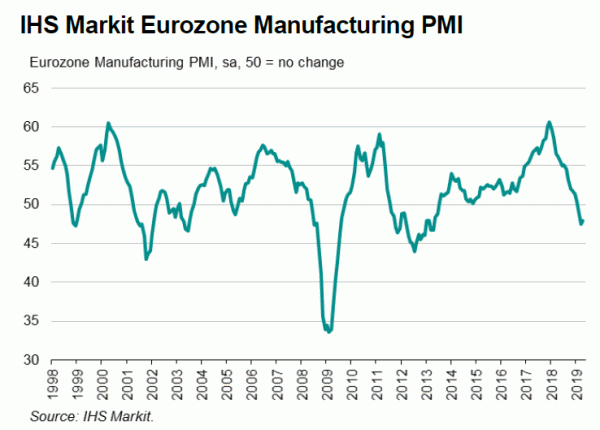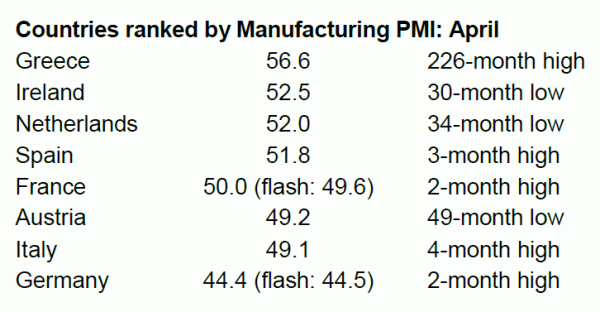Eurozone PMI manufacturing was finalized at 47.9, revised up from 47.8. It was just a slight improvement from March’s six-year low of 47.5. Also, it’s in contraction region below 50 for three consecutive months. Markit noted there were further marked fall in new orders recorded. Also, Germany continues to lead downturn but Greece expands at fastest rate in nearly 19 years.
Looking at the member states, German’s reading was revised down to 44.4, a two month high but remained close to March’s 80-month low at 44.1. Italy and Austria stayed in contraction at 49.1 and 49.2 respectively. France reading was revised up to 50.0, indicating flat activity. Greece reading, though, rose to 226-mont high at 56.6.
Commenting on the final Manufacturing PMI data, Chris Williamson, Chief Business Economist at IHS Markit said:
“The manufacturing sector remained deep in decline at the start of the second quarter. Although the PMI rose for the first time in nine months, the April reading was the second-lowest seen over the past six years, signalling a deterioration of overall business conditions for a third successive month. The survey’s output index is indicative of factory production falling at a quarterly rate of approximately 1%, setting the scene for the goods producing sector to act as a major drag on the economy in the second quarter.
“The downturn remains the fiercest in Germany, with Italy and Austria also in decline and France stagnating. Spain’s expansion remains only modest.
“Some encouragement can be gained from the PMIs having risen in all four largest euro member states in April, and forward-looking indicators such as future expectations, new order inflows and the orders-to-inventory ratio having all come off their lows. But it remains too early to call a turning point, especially as future sentiment remains around its lowest level since the end of 2012, hinting that the manufacturing downturn will persist in the coming months.
“The surveys continue to see widespread concerns over weak global demand as well as reports of businesses struggling amid rising trade protectionism, Brexit and the subdued auto sector.
“The steepest fall in backlogs of work since late 2012 meanwhile suggests firms will increasingly look for cost-cutting opportunities and exercise increased caution with respect to hiring.”


